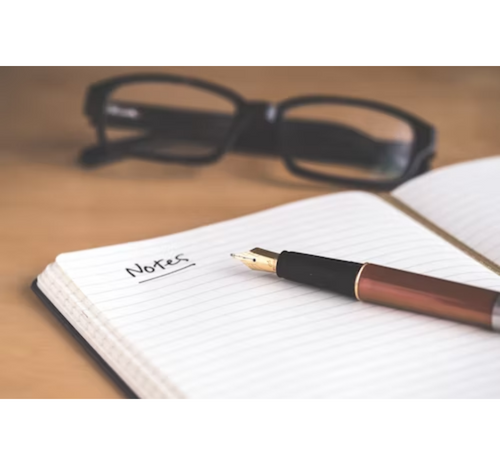When you or your teen attend therapy sessions, you should always bring a notebook or a journal to take notes.
Although it might seem weird to take notes during a therapy session, doing so can make a huge difference when it comes to your personal growth.
Think of it like using a mirror to get ready in the morning.
When you look in the mirror, you get a glimpse of the things you need to change before you are ready to go outside and start your day.
Your hair might be wild.
You might have a lipstick smudge on your teeth.
Your tie might be off-center.
You might have some crumbs on your cheek.
Whether you have a host of changes to make to your appearance or just a small tweak, you are able to learn from your reflection in the mirror and make whatever changes are necessary for you to look presentable before you leave the house.
Imagine if you were to look in your mirror, notice a few issues that need to be fixed, but instead of using your reflection to make these changes, you stepped outside of your bathroom and tried to make every change by memory.
Instead of fixing your makeup as you look in the mirror, you try to remember what needs to be fixed as you head out the house. Instead of looking in the mirror as you shave a spot you missed on your chin, you take the razor with you down the hallway and try to shave where you think the spot might be.
If you were to step away from the mirror to make these adjustments, you’d probably end up leaving the house looking less put together.
While no one would ever do this when they are getting ready in the morning, this is exactly what many clients do when they don’t take notes during their therapy sessions.
They have breakthroughs and gain important insight about their life during their sessions, but then they forget most of what was said during the week when they try to put what they’ve learned into practice.
When a therapist talks to you or your teen about a negative emotional response that is no longer serving you well, it is like noticing a piece of food stuck between your teeth when you look in the mirror. You are able to recognize in the moment that something needs to change.
You might have an issue with codependency.
Your symptoms of depression may be getting worse.
You may need to utilize a coping strategy to deal with your feelings of anger.
You might be projecting your feelings onto someone else.
However, if you forget what your therapist told you later on in the week, it’s like you decided to step away from the mirror rather than looking at it to see where you need to floss.
You and your teen cannot always have a therapist around when you need reminders of coping strategies or other insights brought up in therapy. Notes detailing what your therapist has told you during your sessions are the next best thing.
Here are a few reasons why people should take notes during their therapy sessions:
Taking notes helps people keep track of the information their therapist shares with them. They can revisit these notes, hours, days, months, or years later when they are in need of coping strategies, recommendations, and other essential information in the future.
Taking notes helps improve memory. Writing down notes helps people internalize information, improving their ability to recollect that information in the future.
Taking notes can help people keep track of their progress over time. They will be able to see how they’ve grown and changed throughout the therapeutic process.
Taking notes can help you organize your thoughts and process the information you gained during a session. Therapy sessions can be taxing, but organized notes can help you make sure nothing you covered during your session slips through the cracks.
When you and your teen take notes regularly in therapy, you will have an easier time remembering what you learned about yourself during your therapy sessions, and you will have tangible advice and guidance from your therapist that you can look at whenever you need it.
Don’t walk away from the mirror! Take notes and use them to make adjustments in your life when necessary.
